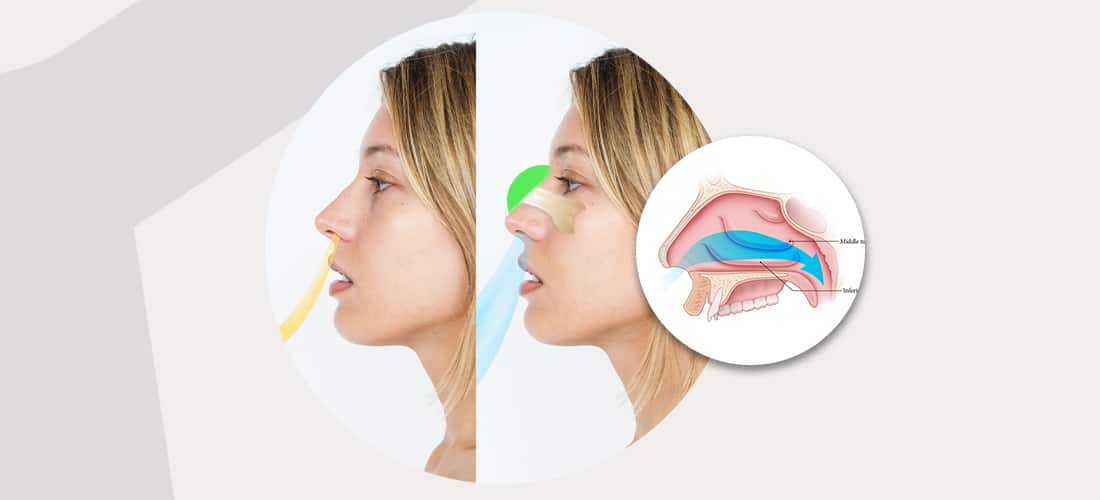
During pregnancy, women encounter a plethora of issues that are quite common yet concerning. One of them is snoring, which we will address in this article. Pregnancy is a time when the body is going through several changes, including your breathing patterns. The vitality of a good night’s sleep and its impact on your and your baby’s health cannot be understated.
As concluded by a 1996 study published on the Chest Journal, pregnant women reported snoring more frequently than non-pregnant women, a fact which can be worrisome. The good news is that there are several effective solutions to help prevent snoring. We will guide you in detail about what you can do to stop snoring during pregnancy and identify its complications.
Key Takeaways
- Elevate your head with pillows and sleep on your side to reduce snoring during pregnancy.
- Stay hydrated and maintain a healthy diet to prevent excessive weight gain that can worsen snoring.
- Use humidifiers and nasal strips to improve airflow and reduce nasal congestion.
- Consider using a mandibular advancement device like VitalSleep to keep the airway open during sleep.
- Avoid smoking, excessive caffeine, and heavy meals before bedtime to minimize snoring.
Causes Behind Pregnancy Snoring
Snoring during pregnancy is due to the physiological changes in a woman’s body as her term progresses. These changes include the narrowing of nasal passages and upper airway, contributing to the habit of snoring.
Partners of expectant mothers go through a disrupted nighttime sleep routine and may wonder why do pregnant women snore. Understanding the causes helps you address the problem and ensure a good night’s sleep, both for you and your partner. It will also answer your query ‘is snoring during pregnancy dangerous?’ better as your doctor will assess the root cause of snoring and address it properly.
Hormone Levels
The unwelcome nighttime companion may be due to elevated levels of estrogen and progesterone during the second trimester. The increased level of hormones is known to cause swelling in mucus membranes and results in fluid buildup, constricting the nasal passage while you lie down to sleep.
Weight Gain While Being Pregnant
Weight gain is often the culprit behind the annoying snoring issue during pregnancy. The additional pounds accumulate extra tissue around the neck and head. This narrows the airway and worsens snoring. Maintain a healthy weight to reduce snoring during pregnancy.
You Snored Before Pregnancy
If you were already a habitual snorer, being pregnant won’t help stop it. In fact, scientific evidence backs the fact that the problem further intensifies during pregnancy. An NIH research suggests that women who snore before pregnancy may be at risk of developing obstructive sleep apnea, a condition that can cause breathing interruptions during sleep.
Environmental Conditions
The Presence of dry air can lead to throat and nasal dryness, which irritates the nasal passages, causing snoring sounds when you inhale and exhale.
Sleep Deprivation
If you don’t sleep well, your throat muscles relax excessively during rest. This further narrows the airway and causes pregnant women to snore.
How to Prevent Snoring During Pregnancy
While snoring during pregnancy is common, you can mitigate the issue with some practical steps. If you are facing the issue yourself or want to know how to help someone else who snores, explore the solutions below. We have explained in detail how these solutions help stop snoring, ensuring wellness for both the mother and the baby.
1 Get Yourself a Mouthpiece
Mouthpieces are quite useful when it comes to snoring during pregnancy. These are designed to effectively reduce snoring and also help with obstructive sleep apnea.
Another study published by NIH established that Mandibular Advancement Devices (MADs) are a type of mouthpiece that tend to be highly effective against sleep apnea, a condition caused by the growth of excess tissue at the back of the throat. They are built to position your jaw forward, keeping the airway open while you sleep.
There are some mouthpieces that we highly recommend pregnant women to use if they want to address the snoring problem. Here is our whole article on the best mouthpieces to reduce snoring if you want to check them out. However, below, we recommend only one, top-tier mouthpiece to help you sleep better, and it’s VitalSleep!

When it comes to custom-fit boil-and-bite mouthpieces, VitalSleep and SleepTight mouthpieces are hard to match. These custom-fit MADs offer an efficient and comfortable way to ensure quieter nights and better sleep quality during pregnancy.
Your dental impression on these devices makes them custom-fit, enhancing wearability and comfort, besides alleviating snoring. That is why VitalSleep anti-snoring mouthpieces reviewed by us are the best option.
2 Side-Sleeping: Your New Best Friend
If your last Google search was ‘how to stop snoring during pregnancy‘, you must have read about how side-sleeping is highly recommended to curb snoring. The tip is specifically helpful for third-trimester pregnancy snoring when adjusting your pregnant belly while sleeping is a struggle.
Sleeping on your side, preferably your left side, relieves pressure on veins and arteries, facilitating better blood flow to the organs and the developing fetus. Placing pillows between your legs, under your belly, and supporting your back further helps you sleep better by ensuring a comfortable and snug position.
To add to the comfort, you can stick on nasal strips for snoring during pregnancy.
The use of these safe and effective strips improves the nasal airflow while you are sleeping.
3 The Magic of Humidifiers and Nasal Strips

One of the simple yet effective natural remedies for snoring during pregnancy is using humidifiers in your room and sticking on nasal strips.
Humidifiers: Dry air contributes to snoring as it affects the moisture level in your nasal passages. Using a humidifier in your room will significantly help in maintaining the desired level of humidity. As a result, the air is moist, preventing dryness in the nasal cavity and throat.
Nasal Strips: The easy-to-use nasal strips are an effective way to reduce snoring. They open up the nasal passage, making it easier for you to breathe freely while sleeping. Read our roundup of the best anti-snoring nasal strips to pick good quality nasal strips that suit your needs.
The combination of the two works wonders to ease your discomfort by helping you and your partner enjoy a restful sleep and quieter nights. While the nasal strips will keep the nasal passage unobstructed, the moist air of the humidifier prevents dryness in the nasal passage, curbing the snores.
4 Pregnancy-Safe Exercises for Snoring Relief
Looking for a remedy for snoring in pregnancy? Strengthening your airways with throat exercises and yoga poses is a tried and tested way to reduce snoring. Incorporating these light exercises we recommend in your daily routine can help alleviate the snoring problem effectively.
Throat Exercises
A simple and effective exercise is to press the tip of your tongue against the roof of your mouth and slide it backward. Doing this simple exercise several times a day will help stop snoring in pregnancy. Another exercise you can try to tone the throat muscles is to open your mouth and move the jaw to the right and left multiple times.
Yoga Poses
There are certain yoga poses that strengthen the throat muscles, thereby opening up the airways and reducing snoring. The Cobra Pose requires you to lie on your stomach, lift your chest, and stretch it to bend your back. As a result, the chest and throat muscles stretch and gain strength. However, the pose can only be practiced in the early first trimester when you are a few weeks pregnant, and that too if your healthcare provider approves it.
Another yoga pose good for strong chest and neck muscles is the Lion’s pose. You need to kneel while sitting, place your palms facing the floor, and exhale while sticking your tongue out. The posture relieves snoring and helps you sleep well. This lion’s pose is safe for pregnant women in their second or third trimester.
5 Pillow Talk: Elevate Your Way to Silence
Your partner might have been informing you lately about being disturbed by the loud snores you have started making, and you may think, “does pregnancy make you snore?”
The answer is often yes. However, with so many ways to find snoring relief, there is nothing to worry about. You can easily learn and manage how to stop snoring in pregnancy.
Just elevating your upper body by propping yourself up with the right pillows is a game-changer. You can use the regular pillows you have or get pregnancy pillows that are purposely designed for maximum comfort. There are anti-snore pillows available, which further enhance the way you can prop yourself up. They support your body in the ideal side sleeping position, preventing you from rolling on your back during the night.
6 Monitor Your Diet: Nutrition that Nips Snoring in the Bud
A question that expectant mothers often find themselves wondering is, “do you snore more when pregnant?” As your pregnancy progresses, weight gain and issues related to the expanding body features progress simultaneously. It’s common for pregnant women to get carried away with impulsive eating, but a careful approach is important. As discussed earlier, excess pounds resulting in tissue growth around the neck and head contribute significantly to snoring. By keeping a watchful eye on your calorie intake, you can avoid bulking up too much.
The American College of Obstetricians and Gynecologists (ACOG) advises expectant mothers to watch their calorie intake. It recommends adding no more than 340 extra calories to your daily intake during the second trimester and around 450 extra calories in your third trimester.
A balanced diet is vital in your pregnancy journey. It helps you avoid excess weight gain that causes snoring and ensures quieter nights and better sleep quality. Including nutrient-dense food in your diet helps, so go for lean meats, low-fat dairy options, fresh fruits, and vegetables to ensure a good balance. Go for protein-rich foods like oily fish, beans, and nuts to provide extra calories.
7 Hydration: The Silent Snore Stopper
If you visit a maternity ward at a hospital at night, you will most probably leave wondering, “is snoring common in pregnancy?” as most of the expectant mothers will be found snoring while sleeping. While the issue is common, there are several solutions to mitigate it, such as keeping yourself hydrated.
Why do you snore when pregnant? One reason that we often overlook is dehydration, as it thickens the mucus, making it more likely to block the nasal passage and aggravate snoring. Keep the nasal passages clear by making sure you drink enough fluids throughout the day. A tip is to keep a water bottle handy in all the rooms so that you don’t ignore proper hydration wherever you are.
What to Avoid if You Snore at Night During Pregnancy
Avoiding some habits and substances helps you reduce snoring, ensuring undisturbed sleep, which is essential for you and your baby:
⚠️ Avoid sweets and treats that will make you gain weight too quickly.
⚠️ Quit smoking, as it can be a significant factor contributing to snoring. Even passive smoking is injurious to your and your baby’s health.
⚠️ Avoid alcohol consumption as it relaxes throat muscles.
⚠️ Watch your caffeine intake as taking it more than 200 mg/day can interfere with sleep pattern and may cause snoring due to sleep deprivation.
⚠️ Develop good sleeping habits. A well-regulated sleep schedule reduces snoring as your body is well-rested. Invest in the best mouthpieces to reduce snoring for a restful sleep.

Snoring and Pregnancy Complications
A woman expecting the first time may wonder if snoring is a pregnancy symptom. It’s common to snore during pregnancy, but it can point towards adverse pregnancy outcome that needs to be addressed. Pregnancy snoring can be a concern if it leads to Obstructive Sleep Apnea, a risky condition that involves airway blockage by excess throat tissue. If your snoring at night is accompanied by symptoms like dry mouth or breathing pauses, it can indicate sleep apnea. In that case, consult with your doctor for further evaluation.
A 2017 study published on PubMed links Obstructive Sleep Apnea in pregnancy to a significantly higher risk of preterm birth. Besides depriving you and the fetus of oxygen, it can also lead to Heart Diseases, Pulmonary Embolism and GD (Gestational Diabetes). American College of Obstetricians and Gynecologists (ACOG) also states in a study that the risk of one of the most detrimental pregnancy outcomes known as Preeclampsia also increases with the onset of OSA.
If you wonder whether snoring goes away after pregnancy, it usually goes away during the postpartum period as you begin to lose weight.
The Silent Night Wrap-Up
As your term advances from the first, second and third trimesters, leading to birth, you may wonder, “Will I stop snoring after pregnancy?” the good news is that snoring during pregnancy is temporary, resolving like many other pregnancy symptoms after you give birth.
Discussing your concerns regarding snoring with your doctor will ensure the risks are weighed in and addressed promptly.
If you are looking for immediate relief from snoring, we have provided several solutions, including how effective mouthpieces are. These affordable devices can be your first line of defense against snoring, letting you breathe easily while you sleep. You can also identify the root cause and address it accordingly so that your snoring in pregnancy will go away.



